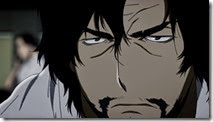 |
 |
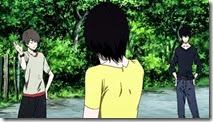 |
In the end, the takeaway from Zankyou no Terror for me is simple – writing really matters.
Kenneth Turan once side of Titanic, “It was best movie that was ever made from the worst script ever written”. Watanabe Shinichirou is no James Cameron – he’s a pretty good writer, for one thing – and this certainly isn’t the worst scripted anime ever (and FWIW, in the end it seems unlikely that Watanabe wrote it). But the larger point hits home for me – no matter how good the direction is, no matter how well a show is directed, no matter how lovely the music, if the writing doesn’t stand up to scrutiny there’s no way that show can ever be truly exceptional.
I’ll say up front that the last episode was one of the best episodes of the series, certainly the best since the arrival of Five on the scene. The ending was undeniably emotionally impacting, largely because of the way it was staged and because of the gorgeous music used for the closing credits. But the problem comes in when you start allowing yourself to think about what’s happening on-screen, because in addition to some serious missteps on the character side and a whole lot of xenophobia, it makes almost no sense.
Does that matter? Well, I suppose that’s in the eye of the beholder. Zankyou no Terror certainly doesn’t make less sense than say, Independence Day, or Air Force One. I would certainly never call either of those great movies, but to be fair to them I don’t think that class of film is trying for any degree of realism. The problem with Zankyou is that it’s presenting itself as something quite different than those popcorn adrenaline flicks – as if it’s trying to be a thoughtful and provocative political and sociological commentary. And heck, it even achieves that sometimes. But that puts the onus on it to avoid making absolutely no sense when it comes to most of its plot developments, because you just can’t have it both ways. If you want to be taken seriously, take your story seriously.
The first sign of trouble for me, in hindsight, was the conceit that no one was dying in these attacks by Sphinx. That irked me right from the beginning because it was clearly quite silly, and as the series was generally operating on a pretty high level in the first few episodes that incongruity really stood out. But that turned out to be just the tip of the iceberg, and the ending – poignant as it was – was really the cherry on top of the sundae (sorry for the mixed metaphor).
Let’s take the high-altitude nuclear explosion. OK, in itself that’s fine – the U.S. Military did indeed do such a test (it exploded a bomb at about 18,000 feet above the desert) and presuming this isn’t a “dirty bomb” (which is what true terrorists would likely try to build, but Nine and Twelve are no ISIS) it would indeed if detonated at 30-odd thousand feet cause a huge EMP powerful enough to knock out electronics but project its fallout into space. But what about the tens of thousands (that’s a guess) of people in hospitals, on life support? On dialysis, or ventilators? What about the planes that surely wouldn’t have been able to land in time, no matter how the episode just ignored that problem after bringing it up in the first place? What about the many people who would have died in the chaos and panic trying to flee Kanto in a matter of an hour?
It’s just silly, period – many people would have died in this incident, just as some would have died in Sphinx’ earlier attacks. The series would have been far better off accepting the reality that the boys were indeed killers, albeit ones who tried to limit the carnage and that society had royally screwed over, and arguably had a worthwhile goal in mind. That would have made them the morally ambiguous anti-heroes – tragic heroes, even – that it seemed briefly the series was setting them up to be. By (again) trying to have it both ways, the entire structural integrity of their story is compromised.
Then we have the ending itself, when the U.S. helicopters showed up at the ruins of the prison where the boys grew up. OK, making the Americans out to be cartoonishly evil is old news by now – “Just let ’em blow up the nuclear plants, not our problem.” But why in the world did they only shoot Twelve and not Nine (yes it’s obvious why for dramatic purposes but that doesn’t count)? And why in the world would they leave two witnesses who very likely knew most of what the boys knew, rather than blowing Shibazaki and Lisa away too and trying to Watergate the whole thing? It just doesn’t make any sense. And there’s too damn much in this show that doesn’t make any sense.
That’s a real shame, too, because the ending really called out that Zankyou no Terror had the seeds of a really good story that it didn’t quite have the chops or the guts to pull off. Twelve and Nine going back “home” to die – to live out the last of their days in childlike play (indeed, it seems that the same after-effect of the drug that killed Five was about to claim their lives too) as Japan sat silent and crippled and the questions they wanted asked started to be asked – that’s a powerful way to end the series. And if Lisa hadn’t been largely turned into a completely stock moe character with no development or backstory her finding a place where she belonged at last, with these ultimate outcasts, would only have made the scenes at the end even more powerful. As it was the final moments of the episode and the ending credits were fabulous, with the reveal of what “VON” really meant and the beautiful concert of image and music. It was a reminder of all the potential this series brought to the table, but only rarely realized.
Zankyou is going to be a tough one to categorize in the long haul. It’s certainly not as good as Watanabe-sensei’s last NoitaminA series Sakamichi no Apollon, but it does share the quality of having had individual scenes and moments that were among the most sublime in recent anime, but ultimately failing to come together as a whole (in Sakamichi‘s case because it was just too short to adapt the story from the manga). The relationship between Shibazaki and the boys was easily the best in the series, but it was largely abandoned for much of it, and Five’s presence made the entire middle third basically a washout. What matters more – how good a series is when it’s at its best, or what it is when you view all of it from start to finish, highs and lows alike? That too is in the eye of the beholder I suppose. I think both are important – what a show could have been, and what it actually was. And by that measure this one is decidedly a mixed bag, but as I’ve said before I’ll take a show with flashes of greatness over one that’s simply mediocre all the time.
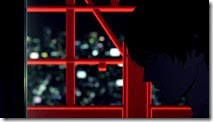 |
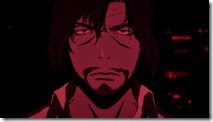 |
 |
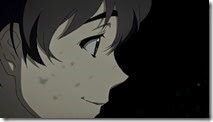 |
 |
 |
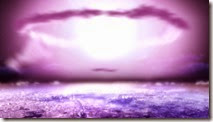 |
 |
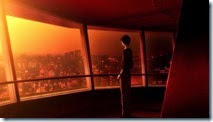 |
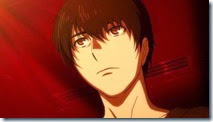 |
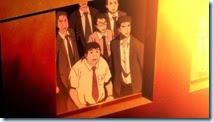 |
 |
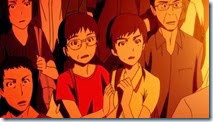 |
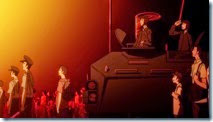 |
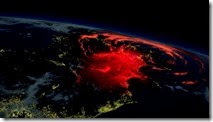 |
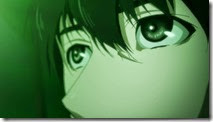 |
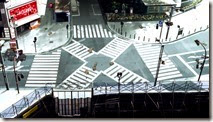 |
 |
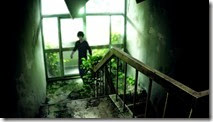 |
 |
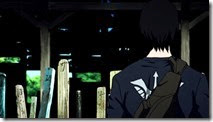 |
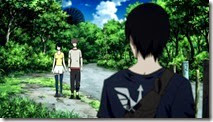 |
 |
 |
 |
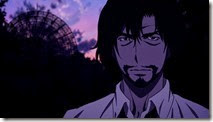 |
 |
 |
 |
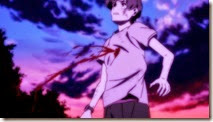 |
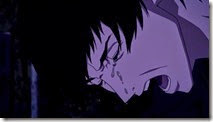 |
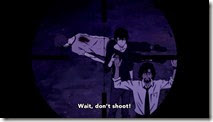 |
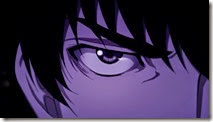 |
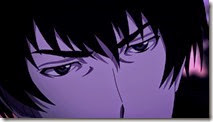 |
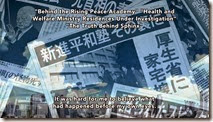 |
 |
 |
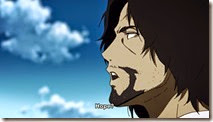 |
 |
ED Sequence:
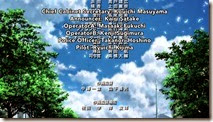 |
 |
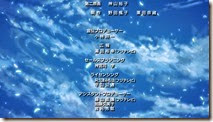 |


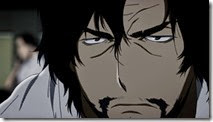
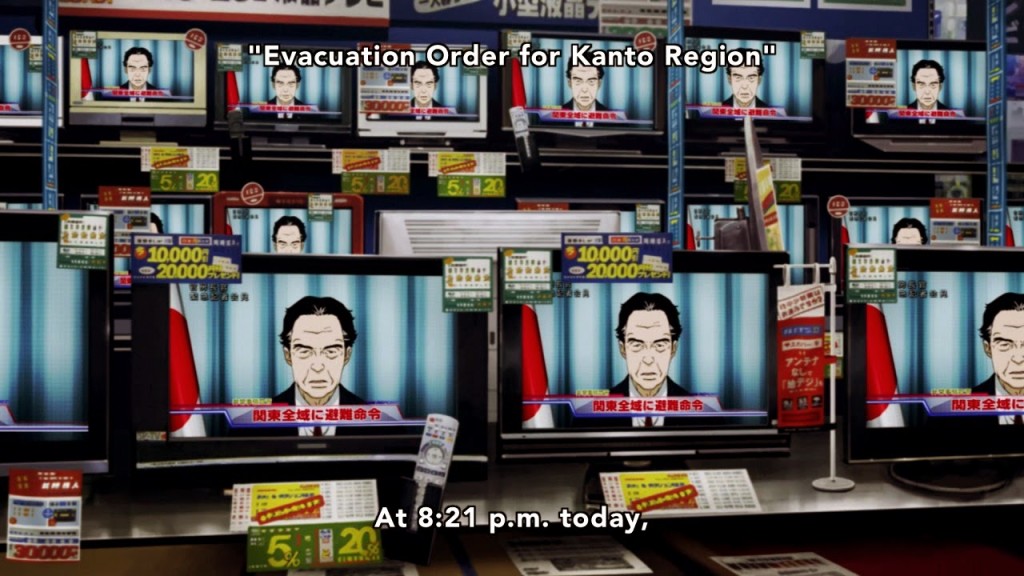
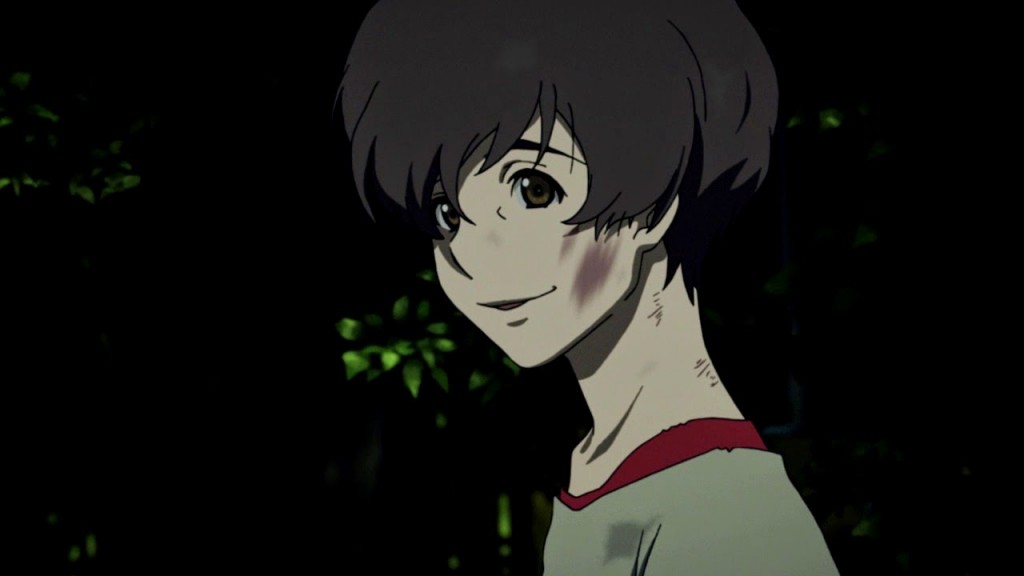
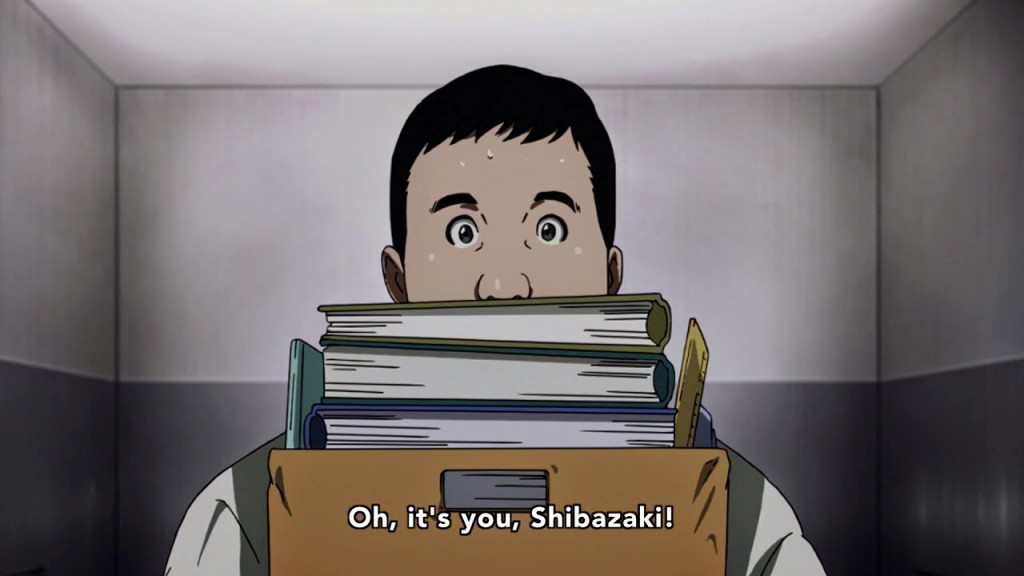
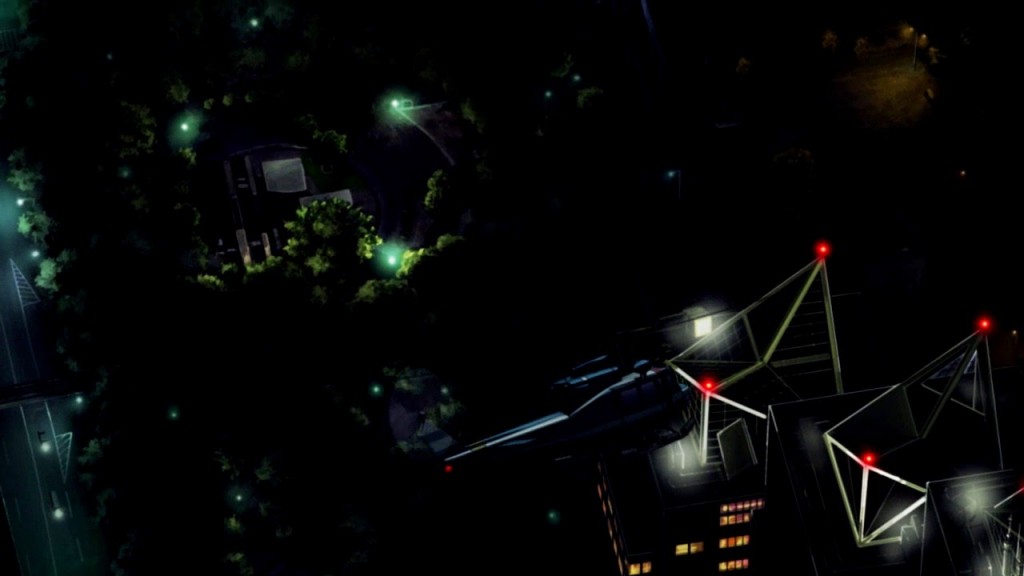
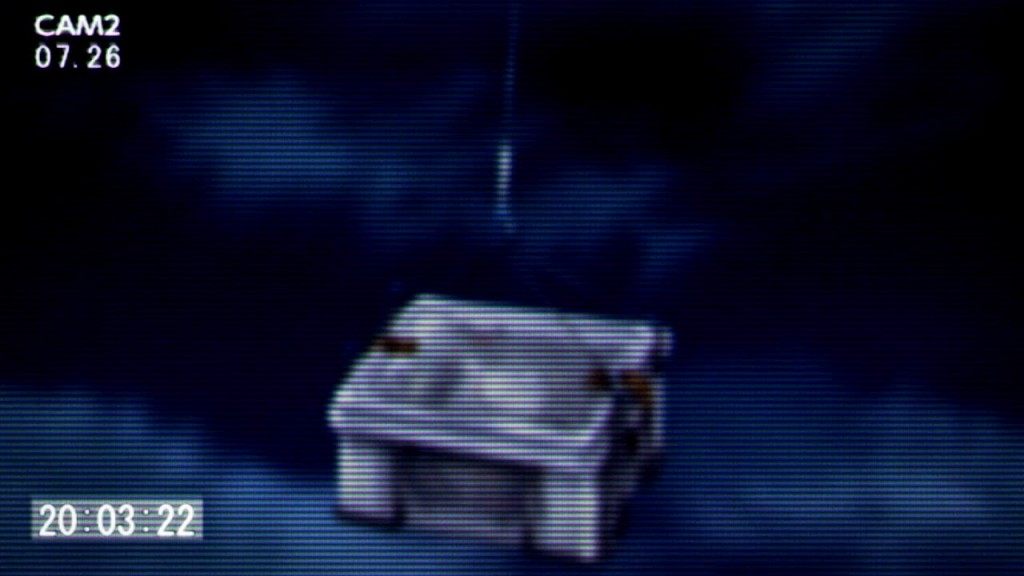
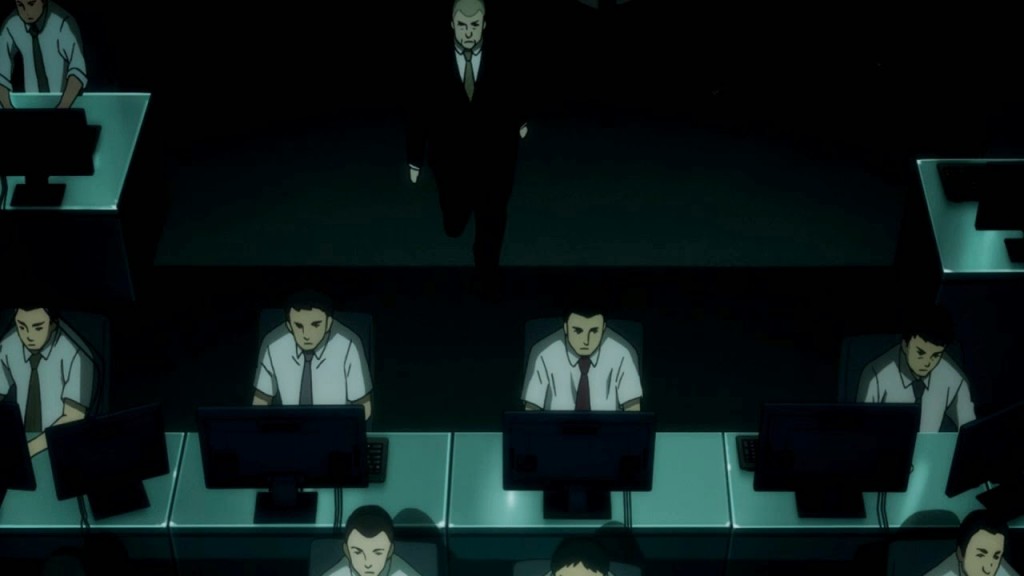
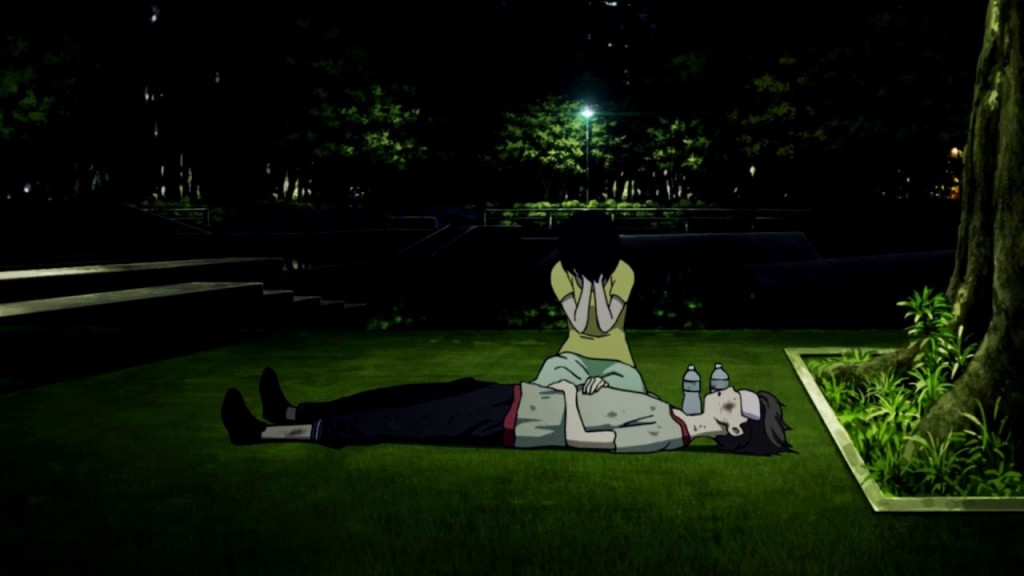
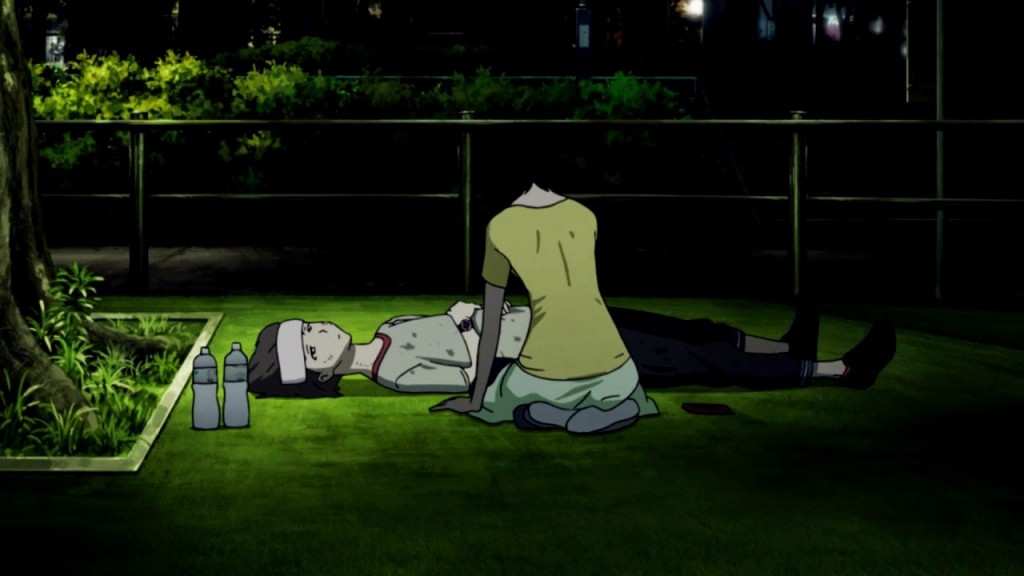
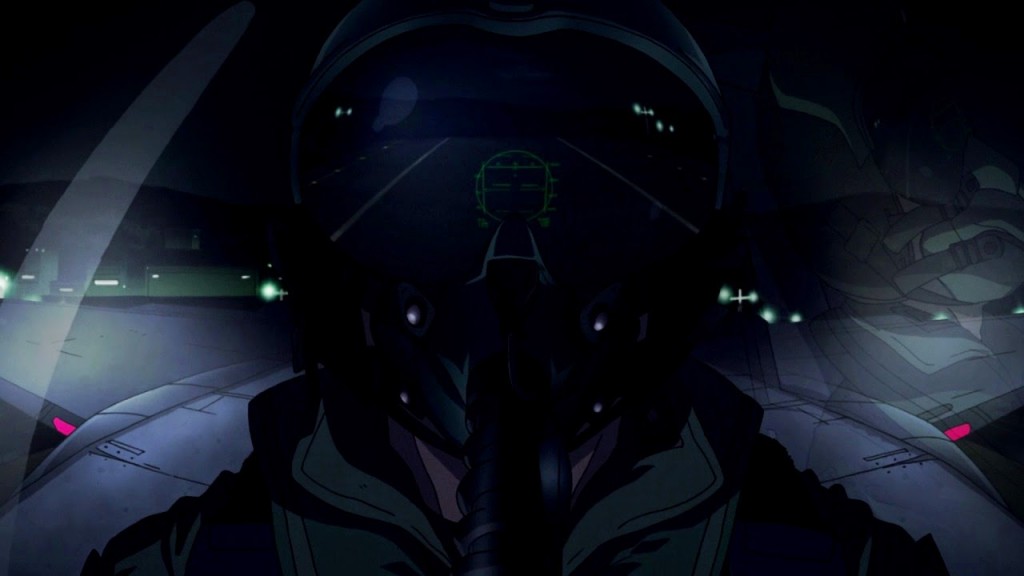
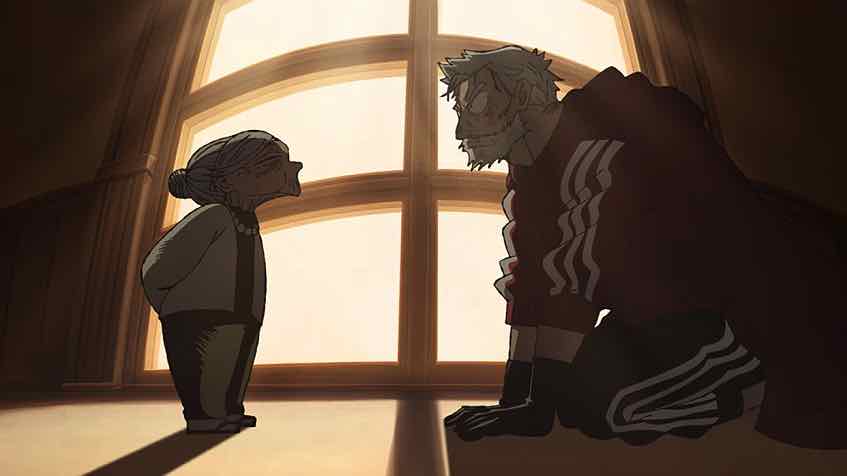
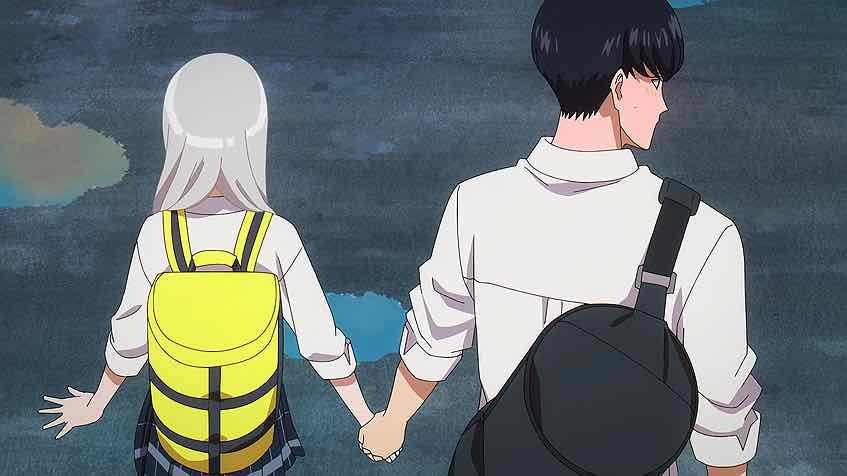
q u a c k
September 26, 2014 at 3:07 pmIncredibly disappointed with this review. The last episode is a gigantic commentary, everything down to Shibazaki looking for and finally finding what the boys were trying to convey. If I have the time this weekend, I will likely elaborate on this in great detail, but in the meanwhile, please reconsider what each part of the episode means, and don't forget that the US dropped an atomic bomb on Japan.
maverickmann84
September 26, 2014 at 3:47 pmI'm not entirely sure where to begin approaching a comment like "don't forget the US dropped an atomic bomb on Japan"…. 1) no one ever forgot that, and as atrocious as that was it was a war started by a Japanese attack. Does that make it ok? No of course not, but to argue the right and wrong of what happens in war and choose one side is silly. You make it seem like the US just went out and said, "fuck the (insert Japanese racial slur) lets drop a nuke on them" not only had no one fully comprehended the scope of what a nuke was (which is still far different than new tech nukes btw), but it was during a war. No side was right, it was war, it's all bad. 2) to then try to use that as some sort of justification for being xenophobic is absurd, as in any justification of any racism, sexism, or prejudice of any kind. You can't win an argument about the value of something by attempting to justify being xenophobic. The fact that you don't understand that makes me realize that I must be the moron for attempting to argue with someone who's argument is founded on such illogical nonsense.
As for the episode being a gigantic commentary, did you hear the writer, producer, or director say that? That's like when lit teachers try to break down one sentence in a novel and say each word was specifically chosen to represent this very specific thing. You don't know that, and you certainly have no proof. If that's what you take from it then that's perfectly acceptable. That's the entire point of storytelling: to have the audience take a specific meaning, and also one that can only be grasped by someone with their specific experiences. But you can't say that's what it has to mean to everyone, or that something so much like a blockbuster action flick, in regards to lack of realism, that tries to present itself as well written and well thought out was written well. It's just flat out bad writing. The directing and animation was phenomenal, and at the end of the day if you found it entertaining then it did it's job as a show, but there's a reason action flicks don't win best screenplay Oscars. They are what they are: exciting and full of top notch production value, but ultimately shallow.
q u a c k
September 26, 2014 at 8:13 pmMy comment was not meant to be empathetic for Japan or anything like that. I was trying to make it apparent why Watanabe was including so many obvious cues in this final episode in reference to the old vs new guard in Japan, a consistent theme in the series that is particularly and greatly expressed in the final episode. I didn't have the time to type out every instance that can be rather easily compared to World War II or Japanese government/politics/culture.
A huge hint that this series is a commentary is this: http://www.otaku2.com/?p=679. If you do not know already, Satou Dai has worked with Watanabe, the show's creator, on several projects in the past such as the most recent Space Dandy. To be blunt, they share many of the same opinions and that is reflected in their work. I would love to elaborate fully on what each reference is when I have the time this weekend, but unfortunately this is all I can give for now.
q u a c k
September 26, 2014 at 8:17 pmI also believe this show's purpose was to put a snag into the common understanding of certain global events that have occurred. At the end of the ED, it even makes it a point to say that these events may be similar but are not meant to be the real things. How I see it is the first episode is similar to 9/11, the second similar to the 9/11 debriefing with conspiracies (or one might say, truths), and the final episode is similar to WWII. To be honest in the final episode, some of the things the characters say are pretty obscure and do not make sense given the situation, but are clear references to moments in history that Watanabe wants to address.
maverickmann84
September 26, 2014 at 3:56 pmI think I would've liked this show a whole lot more if I had gone into it expecting to see something unrealistic, but still thrilling and suspenseful. It's funny how expectations can make such a huge impact on how much you enjoy something. I agree with you, Enzo, that it wasn't well written, and that isn't necessarily a bad thing. Plenty of my favorite shows/movies are dumb and shallow, but still immensely entertaining. Though once again we get another show that proves that great writing is the most important aspect of a great show. There are shows like Baby Steps that lack the big budget and the top notch animation (others like cross game comes to mind), but end up being great bc the script is so in depth and well written. That's what makes H x H such a stand out as well. It combines amazing production value with top notch writing. You don't get to see shows like that very often, and when you factor in its length it becomes like what Wing said about Gon and Killua a "1 in 10million" rarity. I think I need to stop reading studios/cast/directors/writers of shows and just go in to them with absolutely no expectations whatsoever.
pissmarmot
September 26, 2014 at 4:15 pmHave an unhappy childhood? Bomb your city and destroy millions of innocent lives.
The people you hate will be punished. You'll be vindicated. Nobody will forget you, EVER.
If the US made something romantisizing and glorifying that message…
Simone
September 26, 2014 at 10:12 pmYeah, lots of silliness. It especially struck me how tolerant Shibazaki was of the Sphinx boys (he should have been quite angrier), how Lisa somehow escaped being interrogated and arrested, and why the US would try to kill the boys when all they were about to do was expose Japan's violation of treaties – exactly what the US wanted to do all along too?
q u a c k
September 26, 2014 at 11:36 pmLol….
-Shibazaki is a detective/cop and knows how to deal with criminals. He doesn't know what they are packing and could have easily gotten killed by the "terrorists". He also figured out why the boys were doing it and actually understood the corruption, seeing as he went through the same thing in his life.
-They deemed her to be a hostage, why isn't that good enough for you? She was likely spoken to by the police but they didn't feel the need to show that in the episode.
-You actually watched this episode, right? Did you hear what looked like to be the US President on the phone?
Simone
September 27, 2014 at 6:40 amWe're talking about a guy who had a personal thing against atomic weapons, knowing many Hiroshima survivors first hand. And he's not this cold, calculating type – he lets his emotion show a lot. So how would he be so calm and understanding in front of the boys who just blew up a plutonium bomb over Tokyo? That considering also that, no matter how much this is swept under the rug, a stunt like that would have killed THOUSANDS of people. Think about it. All electronics go, and suddenly every patient attached to life support, every one with a peacemaker, is left there to die. Without considering how much people could have gotten stampeded in the panic. The fights in the looting after the power went down. Would you think a NY cop could have stayed that calm when having a chance to arrest a terrorist implied in 9/11 if he only thought that, hey, the guy had a really hard childhood and deserved to had some slack cut to him?
It's a different matter entirely that the show wants us to think that terrorism has a reason behind it – that's good, because it's something we need to keep in mind when wanting to prevent future such acts. But such… philosophically inclined characters when the stakes are so high are entirely unrealistic.
Roger
September 27, 2014 at 3:31 amI really like the little tune that played during the scenes where the three were playing in the ruins. It was fitting yet cruel, emphasizing the fact that this is the first time Nine and Twelve (and probably Lisa) had pure and simple fun in a long while, yet also pointing out that this is certainly their last.
I do have one curious question about the bomb exploding.Shouldn't it have bli8nded those folks who looked directly at the flash of the explosion (such as Nine himself)? even at that altitude (10 km), the initial flash would be significantly bright to cause blindness, plus the radiation (x-rays and gamma rays) can easily burn the eyes.
I would agree that they did make the US too cartoonishly evil, but this one does have some interesting takeaways. It seems that the US government did have some vested interest in the results of the Athena Plan (or might have even funded the work covertly). As such, them eliminating all those who could potentially reveal their connection to the project does seem reasonable for their purpose. And this does connect with the real-life United States government's track record of gathering "valueble" research (such as chemical weapons done by Nazi scientists), no matter how questionable they are.
Still, my biggest gripe here is that Five's storyline could have been weaved in much better. Her backstory could have really enriched both Nine's and Twelve's. And her presence could have also clarified as to what role the US has in the plot. Too bad that she was reduced to a one off villain of sorts.
As for Lisa, I am somewhat satisfied with the role she played in the story. They could have gotten a lot deeper with her character. But still, they were able to nicely lay out her role (yes, even her moe antics) to serve as the humanizing factor for both Nine and Twelve.
admin
September 27, 2014 at 3:54 amBut you know, Roger, nothing about this ending makes sense. In the first place it doesn't make sense that the US Government would be so keen to silence Nine and Twelve, because what they were about to reveal was damaging to the Japanese government, not the US government. If anything they should have dropped a mic and camera out of that helicopter.
But even if you accept that bit of nonsense, they way things proceeded – shooting Twelve and leaving Nine his Oscar moment, inexplicably then deciding to spare Shiba and Lisa – makes no sense either. And that's the problem here – nothing of consequence in this show makes any damn sense. Even thrillers should have an internal logic if they want to be taken seriously even on a superficial level, and if you're going to try and communicate some grand social message or commentary, you have to have a basic level of competence in making the point.
That's it for me, in simple terms – this is a badly written show that was turned into a pretty good one by a phenomenal director, great soundtrack, and a modestly interesting premise to build around.
Roger
September 27, 2014 at 4:20 amThat's exactly why I am still having a lot of issues with how Five's character was handled. Cause her character could really have clarified a lot of things. For one, it's her character that also brings the US into the story, what with her connection to the FBI and her being taken away by an American agency (which was not identified, but I would assume it to be the CIA), but we sadly never got anything about that part of her backstory. In fact, we never even get the significance of Five in the overall narrative. Her dying wish for Nine to live for all of them (the kids who died) could really have beenh poignant if they had just explored her character more.
This really highlights how large an effect that a mishandling of a single character can severely affect the overall structure of a story. I would easily forgive the other leaps in logic if they had just done this one right.
Peng Yang
September 28, 2014 at 2:30 amI explained some of the complaints about this episode down below so for this one I think I'll talk about Five.
Five played a significant role in both character and narrative terms, but because she was around for so long, the cost was too high.
"Five is a waste of space that's better used for better Watanabe magic."
What really makes Five special as a character? Her notorious accent? Her improbably high position? Her uncanny good looks? No, what makes her special is one thing, her history. Specifically her history with Nine (Twelve is sadly an afterthought). If you happened to forget, Five's one and only motivation was to beat Twelve. No really, that's her ONE AND ONLY motivation; once that chance is gone she immediately cremates herself. And no, killing Twelve does not mean beating him, that's not playing by the "rules" after all. Killing your opponent after they beat you in (airport) chess is not beating them, even if they tattle to the authorities.
"OK, but why does that make her important?"
[This is primarily pulled from sonicsenryaku (http://randomc.net/2014/09/25/zankyou-terror-11-end/comment-page-1/#comment-1496572)]
It explains why Nine died "Oscar style". In essence, Five, Nine, and Twelve were all "dead men walking" for the most part. They didn't die because they all had a goal they they simply couldn't die before accomplishing. Five wanted to beat Nine before she died, but she didn't and went out on her own terms instead. Nine and Twelve were committed to revealing the truth which kept them going. Once Twelve died, Nine lost his will to go on (since his primary goal was pretty much accomplished at that point) and succumbed to the aftereffects.
"OK, maybe that could make sense, but really she was a cartoon villain."
I agree with you. Really, I think her authority was over-the-top and over-abused. If we agree to accept this universe's America as "corrupt, always-be-machinating, America" then I can accept and forgive this. Her one-track-mindedness only makes sense if you fully commit to the idea that she was truly and utterly beyond reasoning and hope, which she does gives enough evidence to accept.
However, I think that since people kept looking for more dimensions in her character, they missed the forest for the trees. Because she only only cared about Nine, because she was willing to sacrifice thousands of lives and turn instantly on her government handler the moment he stood in her way, it shows how far gone her mind is. You could call her a cartoon villain, but the fact that the show acknowledged her insane actions (albeit a bit late for "real-life standards") proves that she wasn't MEANT to be seen as a villain that only threw shit at a fan.
"OK, now you're just grasping at straws."
You're completely right. Much of my reasoning assumes things we aren't explicitly told, but they are derived from information we're given and reasoned with a logical mind. Whether you agree or not is your prerogative, and I simply choose to think this way. However, let the record state that I don't think Five is perfect by any means. Her greatest offense in my mind was overstaying her welcome.
I think this actually stems a lot from Watanabe's directing style (assuming he had at least partial involvement with he writing). His two most notable works, Cowboy Bebop and Samurai Champloo, are primarily episodic. In other words, his directing is not yet proven to be conducive for longer, extended, shows. I think because he's unused to having a "villain" for more than a few episodes (bar a few examples), his writing of Five (if he was indeed involved) is less-than-perfect. Even his extended villain arcs usually feature a "slice of [their] life" rather than the "most of the pie" deal we got with Five.
TL;DR: Five isn't necessarily a bad character, she just overstayed her welcome.
BoukenYellow
September 27, 2014 at 4:20 amI actually had a good impression of the show as whole coming off the finale, but I saw all the backlash and re-considered a few things. And now I think the detractors have a point; the who isn't all that good.
I'll disagree with Enzo on one thing, though. I think Five wasn't a lost cause from the beginning. She and Lisa are both cases of wasted potential. I think it's clear what they were trying to do with both ladies: make Lisa the emotional centre, while Five was supposed to be a metaphorical study of the insanity and mental stagnation that extreme cases of isolation bring (I'll raise an eyebrow if you tell me that that didn't reek of potential)- in effect, a hollowed human being. I was never into this show for reality, so I didn't mind the airport chess scene- it established that Five was a child in an in an woman's body, and I hoped they'd go on from there. Somewhere, something fell apart. Lisa never got to blossom as an individual- what she did was always centred around the boys, and the storyline with her mum was dropped after a bit. We never really got a lot of whether she got to "take flight", and her relationship with Twelve-romantic or not- seemed a bit rushed. I wish they'd shown some of Five's earlier days in the American government (from the POV of others) that could highlight how Nine and Twelve got off relatively lucky- because that was certainly the implication, and they certainly intended her to be a tragic figure. That's the thing with Zankyou- it implies a lot of interesting things, but none of them really came to fruit. I get annoyed when people say that Lisa and/or Five served no purpose in the show thematically- it's just that the show never executed them well enough.
The males fared slightly better (I don't think Watanabe's sexist, but it's unfortunate that it ended up like this). Shibazaki, for the most part, seemed like a vehicle to spout the writer's political, social ideas. I liked the bits with Mukasa, Hamura and his daughter (how convenient that he thought of asking a physics student after getting booted off the job), but his character lacked something. I could say the same about Nine and Twelve as there were certain scenes that implied changes in the character, but they were never confirmed and we were left hanging.
Eternia
September 27, 2014 at 12:19 pmEnzo is correct once again.
I failed to see how this anime is the best one of current season, according to some bloggers and their faithful cult follower.
It was flawed on so many level, despite the decent music and such.
These are the same people who complained about Akame ga Kill's flaws , yet they turned blind eyes on ZnT's flaws.
The US is so cartoonish evil yet they won't kill Shibazaki? Who witnessed their evilness first hand?
Even villains in AgK not this weird.
jim
September 27, 2014 at 7:43 pmlol. pls.
Despite all the flaws of this show, it's nowhere near as bad as that garbage you call a show. AgK is lowest common denominator shit.
Rita
September 27, 2014 at 11:49 pmWe'll just agree to disagree. Comparing Akame ga Kill to this show is comparing apples to elephants. There in completely separate quadrants in terms of what kind of story they're meant to be.
Peng Yang
September 28, 2014 at 1:41 amAlright, I just want to point out a couple of things. I admit that not everything made consequential sense but some of your conclusions are a bit too quick.
The big, fat, elephant-in-the-room questions is "why didn't the US forces shoot everyone? My short answer is: it's not necessary, only Sphinx needed to die. The long answer is as follows.
We need to properly consider the primary objective of the US. If you recall, the US authority on the other side of the phone wanted Sphinx silenced because of "airport and Shuta Expressway" incidences, NOT because of the Athena project. Thus, their #1, ichiban concern is their international reputation. It's a big deal if America's greatest ally's has a dark history of human experimentation. It's game-fucking-over for the US in ALL aspects if they're revealed to have used thousands of civilian lives in a sting operation. For that purpose, only killing Sphinx is enough. While it's true that Lisa and Shibazaki know about the airport incident, they don't know about the expressway one.
With regards to the nuclear bomb threat, the US authority cares not about the nuclear facility threat because it's small beans versus the weight of their international reputation. Sphinx is labeled as terrorists after all. "They blew it up because (terrorist reasons)", "it was an accident", "EMP aftereffects"; there are many excuses to cover up that threat. On the other hand, there is only one sure way to seal Sphinx's lips of the airport and expressway incidences.
"But why not just be sure and kill 'em all?"
Killing everyone is a quick solution, but it could lead to a long, slow follow-up that's likely to bite them in the ass later.
First of all, Lisa's and Shibazaki's words can be easily ignored. Lisa was a "hostage", therefore her words are of no effective use immediately. Shibazaki is a veteran detective, but he's also known for his rogue methods, which are sure to hurt his reputation. While his words can be believed for the Athena project, due to his direct recordings and personal visits of the primary masterminds, he's got almost jack-shit credibility when it comes to the airport and expressway incidences. For the airport: "the terrorists called me to stop the airplane from blowing up because of an FBI sting operation that risked thousands of civilian lives." Uh-huh, and how is your family situation by the way? For the expressway: "I was watching out of a window wondering what was going on."
Secondly, like that US authority said, leaving the detective alive means that the media's attention will be focused on Sphinx and Japan's dark side, and not the airport and expressway incidences (they probably will get coverage but it's a molehill to the ATOMIC BOMB mountain). It's actually beneficial to leave Shibazaki alive, because he can and does divert attention away from the US machinations.
Lastly, killing everyone is pretty suspicious. While Sphinx's deaths would be missed by literally only one (MAYBE two) people, they have no other connections. Easy erasure with almost no liability risk. Killing Lisa is a choice, but like I said, she's pretty useless as a source. Killing Shibazaki is actually the worst option. He's got connections and is rather well-known in the police force with his reputation. Killings cops is a big no-no. You can silence politicians, but I know at least one or two policemen in the force who would dig deep to no end to figure out what really happened. Besides, he provides a great opportunity to divert attention away from the US.
That said, I have no idea why they didn't immediately shoot Nine. Maybe they knew he was going to die because of research from Five. This is a endlessly debatable point due to the lack of information.
(to be continued)
Peng Yang
September 28, 2014 at 1:42 amAs for Lisa, my opinion of her is that she's somewhat of a personification of frustration, depression, and the generally hopeless attitude of many of today's Japanese youth. While a backstory might have given her scenes more personal flavor, I felt that her backstory could be filled-in with cultural knowledge of modern Japan. In fact I think she was SUPPOSED to represent the general mindset of a very disillusioned youth. In this sense I suppose she could be considered "stock". I think she gets too much flack because from our eyes we see "blah blah bullying" but maybe from a young Japanese person they see "pressure and expectations from everyone and society".
And she did get development. Her demeanor in the first and last episode were quite evident. Depressed and ready to give up on life in the first, mournful but HOPEFUL in the last. While it can be argued whether her development was artificial, I think her mindset change was steady enough to make sense. Young people are really malleable, y'know, especially the depressed ones waiting for anything to cling on to and believe in. She could have easily been brainwashed into a cult, but instead she clung to two extremists with kind souls, regardless of their intentions.
As for overall opinions, I'll keep it short (finally). When it comes to pure technique I don't think much else needs to be said other than Watanabe and Yoko Kanno. The ambition is great, and for that alone I give it high marks. But as you said, some of the details got lost. If I had to compare it to a fruit (for some reason), I'd say it's like a mango. Wildly colorful on first appearance, it's refreshingly sweet but with random and unwelcome sour spots once you take a bit. But ultimately, it has an extremely strong core that's liable to break your teeth if you bite too hard. And who knows, maybe that seed will later bear fruit just as appetizing.
TL;DR: Zankyou no Terror is a mango. 9/10 would eat again..
John Gottschalk
September 28, 2014 at 10:34 amI think it would be really interesting if Cowboy Bebop came out nowadays, what kind of reviews or commentary it would get. I'd like to think it's closer to the reviews Space Dandy has been getting then the reviews for Zankyou no Terror.
Ronbb
September 29, 2014 at 1:36 amThe production values are high — MAPPA, Watanabe Shinichirou and Kanno Yoko never disappoint — but so much potentials were lost because of bad characters, and the story became too contrived. If the story focused on unveiling the big secret and the morals behind, it would have made a much bigger impact. I think it started off with that ambition but went off track. The characters Five and Lisa didn't help at all, leaving behind Shibazaki being the only engaging character of the cast. I don't know why Nine had to die the moment that Twelve was killed, but his last line, "Remember us…remember that we lived," was powerful, and Ishikawa Kaito did a great job delivering the desperate, sad and hopeless feeling, and that's what the story should have been focused on, instead of those flashy and unnecessary fights between the boys and Five — there's no need for that character and the Americans actually. Too bad, so sad…but it is what it is now.
Carbine Gammaximon
October 3, 2014 at 7:27 amSeriously, its times like this I look at anime and ask myself "Why do I even care?". How do you properly suspend your sense of disbelief when the cause/consequence scale is wack? <—– This is my gripe with this show. Aldnoah was not without its issues but got that cause/consequence part so well.
As for their modus operandi, they blew an atomic bomb because they want to show the world they were experimented on and forgotten. I can understand story producers's approach of no casualties displayed given japan's history, but i think that cost them more than whatever gains they were going for. Imagine the tension you could easily mine from all the characters if there were casualties vs the resolve of 12 and 9 to prove a point. Though there would be a fine line between this and entering casualty-porn-just-because, but the people doing aren't newbies. so there.
Guardian Enzo hit the nail square on the head: this show tried to take itself seriously and then kinda half assed it on its way out.
tak-kun
October 14, 2014 at 5:31 amFinally marathoned the rest of the series. I'm disappointed with it but Guardian Enzo's got the gripes covered.
You know what was a cool show that also featured terrorism, but had some actually neat ideas and social commentary? Eden of the East.